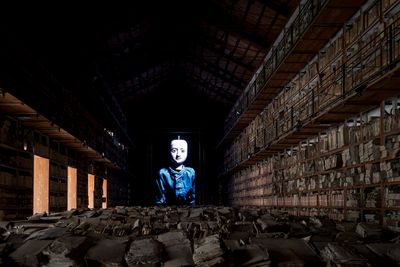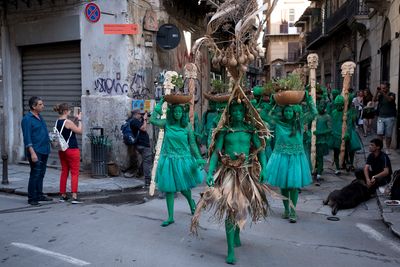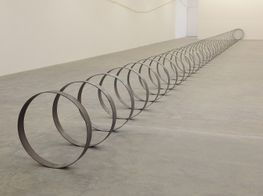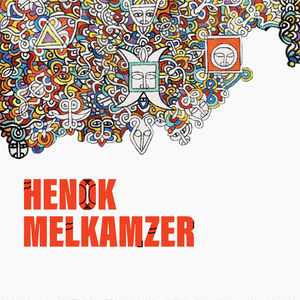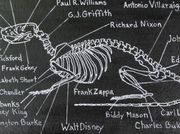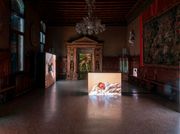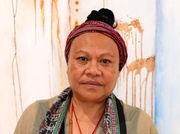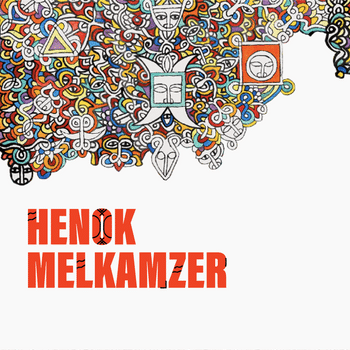Manifesta 12: Cultivating Coexistence
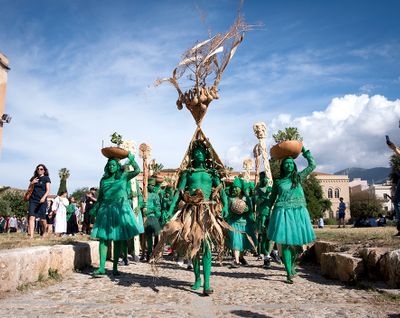
Jelili Atiku, Festival of the Earth (Alaraagbo XII) (2018). Processional performance, mixed media installation. Dimensions variable. Exhibition view: The Planetary Garden. Cultivating Coexistence, Manifesta 12, Palermo (16 June–4 November 2018). Courtesy the artist and Manifesta 12. Photo: Francesco Bellina.
Palermo is one of many European cities undergoing major rebranding. The Sicilian capital is continually working toward shifting its reputation as a mafia stronghold and sex-trafficking hotspot to a more palatable business and tourist-friendly profile. The 1990s Primavera di Palermo social movement aimed at promoting a culture of legality, characterised by the rise in political, social and cultural initiatives as well as the creation of associations and citizens' committees. The movement contributed to enforcing the Palermo protocols: three UN-backed initiatives passed in 2000 to accompany the Convention against Transnational Organized Crime, including the drive to prevent, suppress and punish trafficking, particularly of women and children.1
The Primavera social movement laid the groundwork for the transformation of Palermo into what it is today: a city in flux with an ambition to become a new cultural European destination. This year, it was named 'Italian Capital of Culture' by Italy's Ministry of Culture, an accolade that was repeatedly referenced at the press opening of Manifesta 12: The Planetary Garden. Cultivating Coexistence on 15 June 2018. Culture, as Palermo Mayor Leoluca Orlando and others echoed, serves as a way for Palermo's citizens to take back ownership of their city.
Palermo has proven a worthwhile location for Manifesta 12 (16 June–4 November 2018), curated by a multi-disciplinary team of 'creative mediators': Ippolito Pestellini Laparelli, a Sicilian-born architect and partner at Office for Metropolitan Architecture (OMA); Bregtje van der Haak, a Dutch filmmaker and journalist; Andrés Jaque, a Spanish architect and scholar; and Mirjam Varadinis, a Swiss contemporary art curator. Considering the world as a 'planetary garden', the exhibition draws inspiration from Palermo's landscape and its syncretism of cultures; the city is filled with indelible marks left by the ancient Greeks, Arabs and Normans, to recent arrivals from North Africa, Southeast Asia and the Middle East.
Presenting 50 international artists across 20 different venues in the city, from jaw-dropping palazzos to the roofless church of Santa Maria dello Spasimo, there are three main sections that chart ever-flowing systems of growth. 'Garden of Flows' explores toxicity, plant life and gardening culture in relation to global commons; 'City on Stage' offers a critical understanding of contemporary Palermo life; and the 'Out of Control Room' seeks to make invisible networks of digital circulations tangible.
The garden has always provided a useful lens to think about current geopolitics and cultural shifts. At Orto Botanico, the city's vast, late-18th-century botanical garden, 'Garden of Flows' presents site-specific installations interspersed across the grounds by an eclectic group of artists, somewhat disrupting the garden's well-ordered scientific and aesthetic arrangements. Toyin Ojih Odutola's collection of pastel and charcoal drawings, 'Scenes of Exchange' (2018), are hidden away in an unassuming building at the centre of the garden. These intricate works on paper brilliantly capture the presence of west African life in Italy through the depiction of everyday scenes. (In Lailai Tun Bẹrẹ (2018), a Yoruba title meaning 'Ever Since' or 'Forever Resuming/Restarting', a young woman gazes out into a lush Mediterranean landscape from a balcony.)
Zheng Bo's Pteridophilia (2016–ongoing), further disrupts the natural order of this historic garden. Approaching Bo's work, ecstatic sexual sounds become more audible until a screen hidden within a cluster of bamboo comes into view; it shows scenes of young men sexually arousing ferns. In an ongoing reflection on the eco-queer/eco-sexual movement, Bo aims to communicate the emotive connection between man and nature in our current era of ecological degradation and sexual inequality, whilst queering the symbolism of ferns in Taiwanese history—much valued by locals but disregarded by Japanese colonists during their occupation of the country.
Leone Contini's Foreign Farmers (2018) explores the landscape of Palermo through its vegetation and plant life, paying homage to the hybrid genealogy of vegetables and using seeds as a metaphor for migratory exchanges. Built as a bower in the former colonial section of the botanical garden that was once dedicated to experiments carried out on plant specimens brought over from the colonies, Contini declassifies hierarchies between 'exotic' and local species so that Sicilian cucuzza/summer squash grows alongside its Bengali, Sri Lankan, Philippine, Turkish, and Chinese relatives.
The most succinctly curated and politically charged section of the entire biennial is the Out of Control Room, partially located in the 15th-century Palazzo Ajutamicristo, where a group of works by artists including James Bridle, Tania Bruguera, and Lydia Ourahmane are presented. The entrance hall on the first floor is adorned with flags depicting an array of colourful words and symbols: created as part of Filipo Minelli's participatory project, Across the Border (2010–ongoing).
Beyond this installation is Rayyane Tabet's Steel Rings (2013–ongoing). This is a powerful representation of the Trans-Arabian Pipeline (TAPline), an American business venture from 1950 to 1983 to create a 1,213-kilometre-long oil pipeline that transported oil from Saudi Arabia, Lebanon, Jordan, Syria, and the Golan Heights. Fragments of this pipeline still exist today, and Tabet recreates them for his sculpture using ten-centimetre segments with the same diameter and thickness of the original pipes.
In the courtyard of Palazzo Ajutamicristo, a working phone booth installed by activist group Peng! Collective comes with a set of instructions encouraging visitors to prank call the FBI, CIA and other governmental agencies (Call-A-Spy, 2016–ongoing). The gesture offers a fun and daring approach to the concept of borders and direct action by challenging corporate identities with performative civil disobedience. Gestures of collectivity continue at Palazzo Butera, where LA art collective Fallen Fruit presents Theatre of the Sun (2018): a series of freely available maps tracking fruit trees across Palermo stacked in a pile in a space adorned with specially-designed wallpaper depicting indigenous Sicilian fruits.
Fallen Fruit are known for creating ongoing public art projects, site-specific installations and happenings in cities throughout the world that always use fruit as a material to re-imagine the ways we all interact with public space. Theatre of the Sun is no different. The project is a continuation of 'Endless Orchard': an expanding, global initiative that Fallen Fruit launched in 2017 to collectively map the presence of free fruit available for all in cities throughout the world.
At Archivio di Stato, a now defunct archive founded in 1814 and used for preserving diplomatic, administrative and judicial documents, the politics of mapping takes an archival turn. Here, a large Sicilian puppet created by Mimmo Cuticchio bounces around clumsily on a video stage placed high above an archive filled shelf after shelf with crumbling uncatalogued documents, some of which are files about artists investigated by the government. Protocol no. 90/6 (2018) is a site-specific installation by artistic duo MASBEDO (Nicolò Massazza and Iacopo Bedogni) that pays tribute to the Italian film director, Vittorio De Sica; a spin-off of their Videomobile project conceived to bring video performance to the streets of Palermo. Since access to this location has only been granted for a few weeks, a puppet quite literally dancing on history is an arresting sight: it speaks to a sense of futility when it comes to documenting, understanding, or even remembering historical events.
But The Planetary Garden does not allow such ruminations to fall into unproductive despair. Jelili Atiku's striking processional performance with 53 co-performers covered in green paint armed with local plant species, Festival of the Earth (Alaraagbo XIII) (2018), is one of several performances that occurred during the opening of Manifesta 12. Over the course a few hours, Atiku led both performers and participants from the seafront of Foro Italico, a pedestrianised seafront promenade with expansive views of the Mediterranean and significant for migratory sea crossings, through to the city's historic centre. The action blended elements of Palermo's Santa Rosalia procession, named after the city's patron saint, together with Yoruba mythology, with drumming accompanying the walk through.
With its multiplicity of voices, perspectives and disciplines, Manifesta 12 marks a turning point for this biennial. Particularly in recent years, with the 2014 edition in Saint Petersburg attracting accusations of complicity with an increasingly repressive Putin administration, and the last edition in Zurich receiving a lukewarm critical response at best. The impetus going forward proposes an even more inclusive and interdisciplinary model that continues to rethink the architectural, urban, economic, social and cultural structures of its host cities.
One manifestation of this changing approach is the urban study carried out by Office of Metropolitan Architecture (OMA), who were invited to mediate the complex architectural and urban structures of Palermo by critically reflecting on the evolution of the city's geography, and political, social and cultural shifts over time. The result is the publication Palermo Atlas: a worthy urban study bringing together professional and individual voices to comment on Palermo's past and future—both a curatorial guide and a legacy project to Manifesta 12.
As a whole, The Planetary Garden. Cultivating Coexistence engages sensitively with Palermo's geopolitical position on the edge of the Mediterranean through a genuinely wide-ranging and rigorous selection of artworks, while contemplating the institution's current challenges and future aspirations. (Even if the grandeur of the the city's locations takes the attention away from artistic commissions, at times.) Rather than proposing solutions to ongoing global issues, the exhibition encourages viewers to understand the processes—often invisible and beyond our control—that continue to shape the world today. As for Palermo itself, only time will tell if culture can return this city to its citizens. — [O]
—
1 See, Protocol to Prevent, Suppress and Punish Trafficking in Persons Especially Women and Children, supplementing the United Nations Convention against Transnational Organized Crime adopted and opened for signature, ratification and accession by General Assembly resolution 55/25 of 15 November 2000, https://www.ohchr.org/Documents/ProfessionalInterest/ProtocolonTrafficking.pdf

